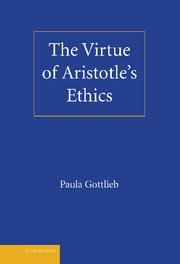Book contents
- Frontmatter
- Contents
- Preface and Acknowledgments
- Abbreviations
- Introduction
- PART I ETHICAL VIRTUE
- PART II ETHICAL REASONING
- 6 Moral Dilemmas
- 7 Fine Motivation
- 8 The Practical Syllogism
- 9 What the Good Person Has to Know
- 10 A Polis for Aristotle's Virtues
- Conclusion
- Appendix: Uniting the “Large-scale” Virtues
- Select Bibliography
- Index
9 - What the Good Person Has to Know
Published online by Cambridge University Press: 29 September 2009
- Frontmatter
- Contents
- Preface and Acknowledgments
- Abbreviations
- Introduction
- PART I ETHICAL VIRTUE
- PART II ETHICAL REASONING
- 6 Moral Dilemmas
- 7 Fine Motivation
- 8 The Practical Syllogism
- 9 What the Good Person Has to Know
- 10 A Polis for Aristotle's Virtues
- Conclusion
- Appendix: Uniting the “Large-scale” Virtues
- Select Bibliography
- Index
Summary
As part of the longer argument towards the conclusion that ethical virtue is central in Aristotle's Nicomachean Ethics, in the previous chapter and in Chapter 5, I argued that ethical virtue requires practical wisdom and conversely in two different ways. In Chapter 5, I explained how ethical virtue involves reason (practical wisdom) as opposed to being merely in accordance with reason, and in Chapter 8, I explained how the practical syllogism that the person with practical wisdom gets right, involves the virtues of character. However, the aspects of practical wisdom I have discussed so far have been fairly minimal, so one might think that the person with practical wisdom needs to know a lot more than what I have so far discussed. Therefore, in this chapter, I raise some puzzles about what, or how much, the Aristotelian good person has to know, and what the good student needs to know in order to study ethics. The answers have far-reaching consequences for the way in which we should read Aristotle's own Nicomachean Ethics, as well as for the appropriate way to address the immoralist.
It is uncontroversial that Aristotle thinks that knowledge is insufficient for ethical virtue (e.g., EN II 1105b1–5, 12–18 cf. X 9 1179b4–10). Reading a book is no substitute for engaging in virtuous action. However, it is unclear what knowledge, if any, is necessary for being a good person, according to Aristotle. On the one hand, there are philosophers, like David Wiggins, who think that the good person can grasp the situation at hand and do the right thing without any knowledge of general principles or of other disciplines.
- Type
- Chapter
- Information
- The Virtue of Aristotle's Ethics , pp. 173 - 190Publisher: Cambridge University PressPrint publication year: 2009



